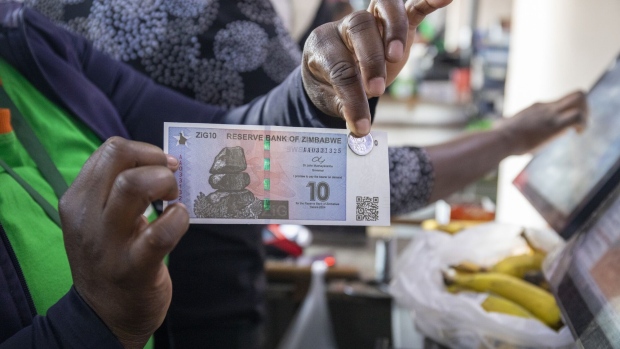May 10, 2024
Zimbabwe Hypes New Gold-Backed Currency in Search for Investment
, Bloomberg News

(Bloomberg) -- Zimbabwe is making a fresh push to lure foreign capital and is using its new gold-backed currency to persuade investors it won’t repeat mistakes that led to hyperinflation and economic woes in the past.
The southern African nation, whose serial currency crises have made it a watchword for policy malpractice, kicked off an international road show that took it to Johannesburg last week with upcoming visits planned for London and Dubai.
Still, skeptics doubt the ZiG, short for Zimbabwe Gold, will avoid the same fate of its predecessors, which were all rendered worthless by the government’s habit of printing money to finance spending.
Zimbabwe on Thursday announced fines to enforce the use of the unit’s official exchange rate – set daily by the central bank – to shore up confidence, and is compelling companies to pay part of their taxes in the unit to encourage its use.
“The ZiG on its own is not a prompt for foreign investors to commit fresh capital to Zimbabwe,” said Hasnain Malik, the head of equity strategy research at Tellimer in Dubai. “For that they need to see the build-up of hard currency reserves and a track record for easy convertibility and repatriation.”
Unveiled on April 5, the ZiG is Zimbabwe’s sixth attempt at a stable local currency in 15 years. It replaces the Zimbabwean dollar, whose value had plummeted 80% against the greenback since the start of the year, and is backed by 2.5 tons of gold and $100 million in foreign exchange reserves held at the central bank.
Although the greenback remains the top choice on the streets, ZiG notes and coins are now circulating and the central bank has vowed not to print any more bills unless it can back them with reserves. It also plans to publish annual data to prove it’s keeping its word.
Analysts are reserving judgment.
They recall how President Emmerson Mnangagwa declared Zimbabwe open for business in 2018 after replacing longtime ruler Robert Mugabe, and little changed despite a world tour to court investors.
Mnangagwa is now on a US sanctions list amid allegations of corruption and human rights abuse, though restrictions on the country were eased in March.
“I don’t think they will be encouraged to invest until we get clarity on the effectiveness of the new regime,” said Jacques Nel, at Oxford Economics Africa. “Even if the roll-out took place in a smooth and ordered manner, which it didn’t, Zimbabwean authorities still lack the credibility needed to implement a plan like this.”
Zimbabwe has been locked out of capital markets since 1999 for defaulting on its debt and to restore access it needs to clear billions of dollars in arrears with creditors including the World Bank, European Investment Bank and Paris Club.
It’s working to fix that by deepening ties with the International Monetary Fund and hopes to secure a staff-monitored program in the second half of 2024.
IMF Ambitions
Abebe Selassie, head of the Washington-based lender’s African Department, told Bloomberg last month that that was a realistic time frame. Such an arrangement would not itself include financing, but could be a stepping-stone to IMF lending in the future.
Restoring access to development lenders would be a major step toward restoring confidence in the country, which has an abundance of natural riches including gold and lithium vital to decarbonization.
Still, for investors attending the May 2-3 event in Johannesburg’s leafy northern suburbs, policy uncertainty remains a major concern.
“While the ZiG being gold backed will provide a certain level of stability, investors often need time to understand the direct impact,” said Valentine Garacho, co-founder of Zerttew Global which has mining interests in Zimbabwe. “Ultimately, what investors want to be clear about is the security of their investment.”
Neighboring South Africa is the nation’s largest trading partner, making it a priority stop in any search for investors, given several of its big banks and retailers are already there doing business.
Team Zimbabwe will next month head to London and Dubai. The London investment roadshow will be held June 10 to June 13, according to a Treasury spokesperson.
‘One-Stop-Shop’
The country set up the Zimbabwe Investment and Development Agency in 2022 as “a one-stop shop” to attract suitors, said Tafadzwa Chinamo, its chief executive officer.
In the first quarter of this year, China topped the list of nations with planned investments in Zimbabwe alongside India, Pakistan and South Africa. Chinese investments were $286 million, according to agency data.
The Zimbabwe-South Africa Business Chamber also plans to lobby its counterparts in Europe and the US to seek investors.
It points to the repeal of an empowerment law which previously required a 51% controlling stake be held by locals, as an example of progress toward a more investor-friendly environment.
“The idea is to jump onto a plane with them to Zimbabwe,” said chamber Chairman Farai Madziwanyika during the conference. “Our message to them is do you want to wait until things are perfect, or you go in now?”
--With assistance from Monique Vanek.
(Updates with details for London meeting in 19th paragraph and chart)
©2024 Bloomberg L.P.






